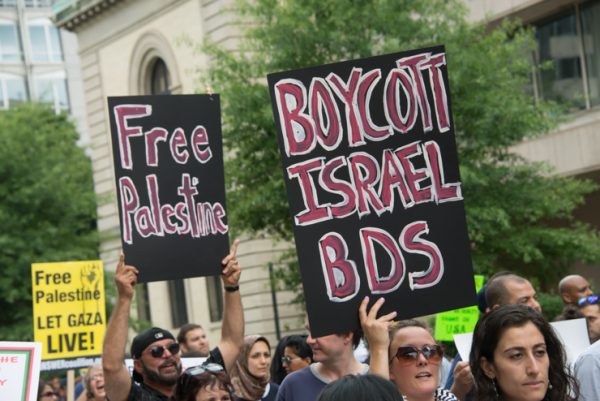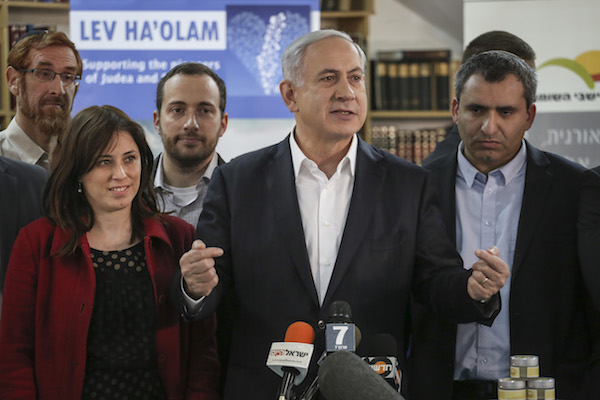Although the Israeli government’s crackdown on the BDS movement will doubtless boost sympathy for its cause, progressive settlement boycotters should think twice before getting onboard.
By Abe Silberstein

When Prime Minister Benjamin Netanyahu compared settlement evacuation to ethnic cleansing last September, it became clear that the Israeli government was redoubling its efforts to improve the reputation of the settlement enterprise.
Recent moves taken against boycott, divestment and sanctions (BDS) supporters seem to have cemented this approach: 2017 has seen a travel ban directed at BDS advocates and settlement boycotters, Public Security Minister Gilad Erdan’s proposal for a database of Israeli BDS supporters, and the detention of Jeff Halper — an Israeli citizen and BDS advocate — on suspicion of “incitement” for possessing boycott-related materials.
In addition, the Israeli government has also highlighted the legal steps taken against BDS by supporters of Israel outside the country. In the United States, Congress and state legislatures have considered laws to penalize and even publicly shame supporters of a boycott. Many of these bills, according to Americans for Peace Now, not only fail to make a distinction between Israel and “territories controlled by Israel,” (i.e. the settlements), but also explicitly include the settlements.
This broad and indiscriminate attack on boycotts will no doubt have the effect of increasing sympathy for BDS. Likewise, BDS advocates will surely use this law to persuade those who have until now targeted only the settlements to support their movement. While making this switch may be tempting, supporters of a settlement boycott should resist, as there are important and unbridgeable differences between BDS and a progressive boycott of the settlements.
Settlement boycotters identify the settlement enterprise as a key obstacle to a final status agreement, an unjustifiable behemoth which can only be sustained through military occupation. By separating Israel and the occupied territories, we pointedly refuse to identify Jewish national self-determination as a problem in of itself. The same applies for Palestinian national aspirations. In short, we reject the conflict as a zero-sum game.
In contrast, the BDS movement’s goals are far more expansive and would amount to complete Israeli capitulation, including a full right of return for Palestinian refugees to Israel. The settlements actually benefit the BDS movement, because many of its advocates prefer a one-state solution: they are able to argue that as the settlement enterprise is so extensive, a single state is a pragmatic solution which fits the “facts on the ground,” as opposed to being a malicious attempt to jettison the State of Israel.

Despite increasingly illiberal and undemocratic measures by the current Israeli government, diaspora supporters of a settlement boycott have not given up on Israel’s citizens. Indeed, diaspora Jews are not the ones who initiated a settlement boycott.
For decades, Gush Shalom has maintained a boycott of the settlements and Peace Now maintains a list of settlement products to boycott — both of them Israeli NGOs. Additionally, dozens of prominent Israelis have signed petitions pledging to boycott settlements, including Amos Oz and David Grossman.
Instead of making common cause with a movement whose uncompromising positions will necessarily alienate the vast majority of Israelis, progressives should continue to highlight the moral and existential dangers of the settlements. This is the only way to reach the majority of Israelis who continue to support the two-state solution and are not fixated on protecting the settlements at all costs.
However, if making common cause with the BDS campaign should be avoided, so too should affiliating with the broad umbrella opposition to BDS, whose aggressive tactics mirror those of Erdan and the Israeli government. Last Wednesday, J Street U students were denounced as members of “an anti-Semitic organization” at the Israeli Mission’s Ambassadors Against BDS conference — a statement that was reportedly met with cheers by the crowd of mostly pro-Israel college students.
The State of Israel may no longer make a distinction between us and supporters of BDS, but it’s one well worth maintaining. As the mainstream anti-BDS movement is hijacked by the Right (if it was ever initially in anyone else’s control), and as the BDS movement continues to promote unrealistic policy demands, a settlement boycott remains the most practical and provocative means of stripping legitimacy from Israeli rule over Palestinians in the occupied territories.
Abe Silberstein writes on Israeli politics and U.S.-Israel relations from New York. His work has previously appeared in Haaretz, The Jerusalem Post, and +972 Magazine.
